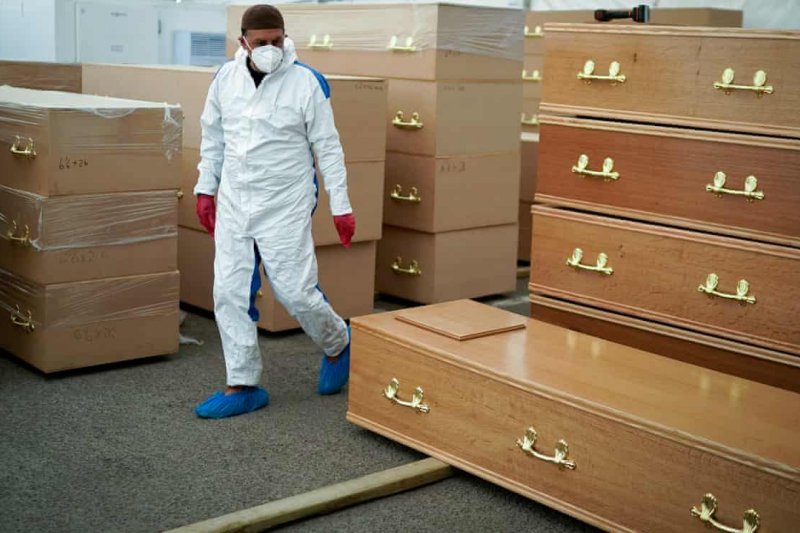Dealing with Death: Covid's Toll on UK Crematoria and Morgues
When the UK’s first victim of Covid-19 died on 5 March, there were only 116 recorded infections in the country and few people countenanced a death toll of 100,000.
But for government planners it was different. Emergency response experts tasked with “mortality management†braced for a death toll that they feared would dwarf anything seen since the second world war. As fatalities mounted in China and Italy, the worst-case scenario for the UK was so grim that one scheme hatched involved storing thousands of bodies in a warehouse in east London.
Another was to anchor a ship in the Thames and load it with containers adapted to hold racks of bodies, a senior official who worked on the plans as part of London’s “gold command†told the Guardian. “It was incredibly chilling,†they said.
In Birmingham, plans were developed for a mortuary in an airport hangar, in Glasgow a warehouse on an industrial estate was primed, and in Cardiff the Welsh government began sourcing space to hold bodies amid fears of a worst-case death toll of 20,000.
Pre-prepared disaster plans for handling pandemics, natural disasters and terrorist attacks show London had 3,500 mortuary spaces. But the capital braced for the virus with an additional 12,000 mortuary spaces. If cemeteries could not cope, bodies would be frozen to await their final committal. There were plans to transport scores of bodies at a time between storage locations in trucks, the official said, a practice that risks misidentifying or even losing the dead.
There were moments when the system seemed to strain. Body bags ran out at one point and their price rose tenfold, which meant the armed forces had to give up some they had in reserve for battle casualties.
Officials said they wrestled with unforeseen difficulties, such as a backlog of bodies from the Greek Orthodox community whose families wanted them to be buried in Greece. That was not possible as flights were grounded.
In April, trench graves were dug in east London at the Eternal Gardens Muslim burial ground in Kemnal Park, south-east London, in response to high death rates and the religious mandate to bury bodies within 24 hours. It was a shocking but rare sight and in the end mortuary, burial and cremation facilities were stretched rather than overwhelmed. Neither London’s ship nor its warehouse were needed and the country coped with the practical realities of a death toll 19% higher than on average for the previous decade. Now it is being asked to respond again as officials once more handle a sharp rise in deaths.
A temporary mortuary with capacity for 672 bodies, and more if needed, is being prepared at Breakspear crematorium in Hillingdon, north London, while planners in Kent, Surrey and Lincolnshire have started storing bodies in temporary marquees to create space in crowded hospital mortuaries. In November, Lancashire county council erected a temporary storage unit for 210 bodies in a business park near Leyland, although it is yet to be used. In Birmingham, where Handsworth cemetery filled up after the first wave of coronavirus deaths, with Muslim plots running out fastest, burials are being redirected to open plots at Sutton New Hall on the north-east edge of the city.
(Source: The Guardian)













